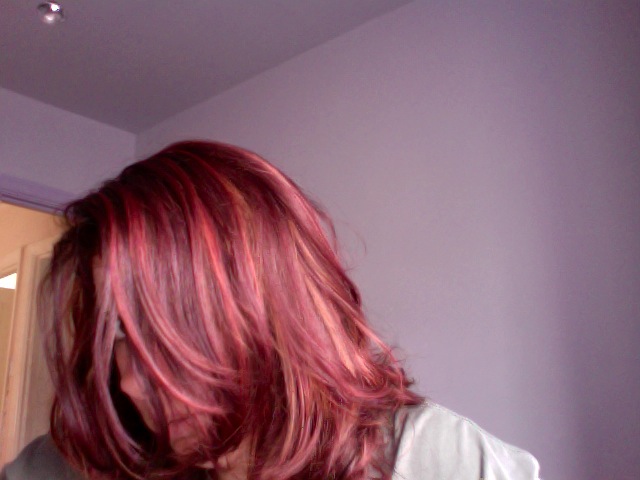1) What author do you own the most books by?
Ursula LeGuin or Steven Brust. That’s a close call.
2) What book do you own the most copies of?
Peter Pan
3) Did it bother you that both those questions ended with prepositions?
No. But that question got a bit meta, didn’t it?
4) What fictional character are you secretly in love with?
It won’t be secret if I tell you!
I used to be not-so-secretly in love with Howl from Howl’s Moving Castle by Diana Wynne Jones, also with Armand from Interview with the Vampire by Anne Rice and with Andry from Melanie Rawn’s DragonStar.
5) What book have you read the most times in your life?
The Dispossessed by Ursula Le Guin.
6) What was your favorite book when you were ten years old?
The Changeover by Margaret Mahy (probably).
7) What is the worst book you’ve read in the past year?
Worst? As in the one I liked the least, right? This is a terrible value judgement question. I honestly don’t think I’ve read any books in the past year I really disliked. But I didn’t like the latest John Grisham. I think I’m burned out on Grisham. I’m giving all my Grishams to Oxfam. Oh, and I hated We Need To Talk About Kevein by Lionel Shriver but I read that last year.
8 ) What is the best book you’ve read in the past year?
Not counting re-reads or the Arthur C. Clarke award list it’s probably Old Man’s War by John Scalzi. Alternatively The Female Man by Joanna Russ. Both very different books.
9) If you could force everyone you tagged to read one book, what would it be?
Bad Blood by Rhiannon Lassiter. Oh, you mean by someone else? Things Fall Apart by Chinua Achebe.
10) Who deserves to win the next Nobel Prize for literature?
I don’t know who’s in the running.
11) What book would you most like to see made into a movie?
Tanglewreak by Jeanette Winterson.
12) What book would you least like to see made into a movie?
The Left Hand of Darkness by LeGuin. It would be butchered by any studio that took it on.
13) Describe your weirdest dream involving a writer, book, or literary character.
I was Morgan in The Mists of Avalon by Marion Zimmer Bradley and I was at the court of King Arthur engaged in a political power battle with Vivian who was also someone I know in real life.
14) What is the most lowbrow book you’ve read as an adult?
I’m not wild about how this question is loaded. I will read anything from the back of a cereal packet to Shakespeare. I have read Jackie Collins novels and Freya North – are those low brow enough for this question?
15) What is the most difficult book you’ve ever read?
Difficult? Anathem was very long. The longest single volume book I’ve read, I think. But Incandesence was very short and involved some really complicated concepts. How about The Sparrow. That was very painful to read. If this question is looking for something high-brow(TM) how about Ulysses by James Joyce?
16) What is the most obscure Shakespeare play you’ve seen?
According to my father, A Winter’s Tale.
17) Do you prefer the French or the Russians?
French poets, Russian authors.
18) Roth or Updike?
Neither.
19) David Sedaris or Dave Eggers?
Eggers.
20) Shakespeare, Milton, or Chaucer?
Shakespeare, but I’d rather pick Webster.
21) Austen or Eliot?
Eliot – although I do enjoy Austen.
22) What is the biggest or most embarrassing gap in your reading?
Not enough world literature, all very Euro-centric.
23) What is your favorite novel?
The Dispossessed by Ursula Le Guin.
24) Play?
The Applecart – George Bernard Shaw.
25) Poem?
Lay Your Sleeping Head, My Love – Auden
26) Essay?
Macbeth and the Metaphysic of Evil – G. Wilson Knight
27) Short story?
The Nine Billion Names of God – Arthur C. Clarke
28) Work of non-fiction?
Shakespeare and the Goddess of Complete Being – Ted Hughes
29) Who is your favorite writer?
Ursule Le Guin. Big surprise, right?
30) Who is the most overrated writer alive today?
There are some really negative questions in this quiz but this one is particularly hard to judge. Rated by whom? Overrated how? Probably JKR or Shakespeare because of the sheer weight of people who believe that theirs is the best writing ever. But that’s an answer by the numbers. It’s hard to think of an honest answer that isn’t prejudiced or offensive.
31) What is your desert island book?
Something very long with lots of ideas to think about. I’m prepared to take nominations. The Complete Works of Shakespeare until I think of something better.
32) And … what are you reading right now?
Just finished Beyond Black by Hilary Mantel. About to read a non-fiction book abut an EcoHouse.



